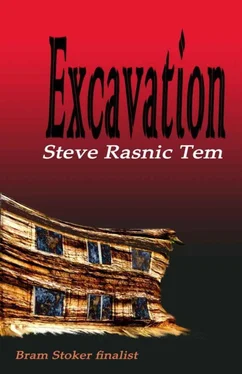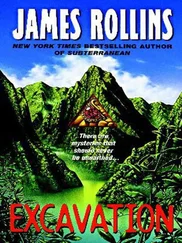Steve Tem - Excavation
Здесь есть возможность читать онлайн «Steve Tem - Excavation» весь текст электронной книги совершенно бесплатно (целиком полную версию без сокращений). В некоторых случаях можно слушать аудио, скачать через торрент в формате fb2 и присутствует краткое содержание. Год выпуска: 2010, ISBN: 2010, Издательство: Crossroad Press & Macabre Ink, Жанр: Ужасы и Мистика, на английском языке. Описание произведения, (предисловие) а так же отзывы посетителей доступны на портале библиотеки ЛибКат.
- Название:Excavation
- Автор:
- Издательство:Crossroad Press & Macabre Ink
- Жанр:
- Год:2010
- ISBN:978-1-452-38320-0
- Рейтинг книги:3 / 5. Голосов: 1
-
Избранное:Добавить в избранное
- Отзывы:
-
Ваша оценка:
- 60
- 1
- 2
- 3
- 4
- 5
Excavation: краткое содержание, описание и аннотация
Предлагаем к чтению аннотацию, описание, краткое содержание или предисловие (зависит от того, что написал сам автор книги «Excavation»). Если вы не нашли необходимую информацию о книге — напишите в комментариях, мы постараемся отыскать её.
Excavation — читать онлайн бесплатно полную книгу (весь текст) целиком
Ниже представлен текст книги, разбитый по страницам. Система сохранения места последней прочитанной страницы, позволяет с удобством читать онлайн бесплатно книгу «Excavation», без необходимости каждый раз заново искать на чём Вы остановились. Поставьте закладку, и сможете в любой момент перейти на страницу, на которой закончили чтение.
Интервал:
Закладка:
He opened the pickup door and slid out. Later, he would wonder whatever possessed him.
The fog had begun to burn off in earnest, but it only made the countryside more unapproachable as far as Charlie was concerned. In spots, like fifty feet in front of the truck, it was clear as a new picture window. He could see the corner fence post of Jack Martin’s north pasture, one cow coming up to it even as he watched, and further down the road the big roadside hickory that marked the beginning of Bob Collins’s land.
But closer in, in the shadows of the trees, the fog was thick as lace hung up sopping wet, seeming to cling to every irregular surface. On the left bank it was especially thick in places, heaviest where the bank was piled high with old debris and driftwood from the flood, pushed there when the road crews bulldozed the road clear. You could tell the dirt was from the old dam: the color was darker than the rest of the bank, with coal trailings here and there. The variation of thickness in the fog made Charlie uneasy; it made the fog seem more substantial than it should be, as if it had something in it for thickening, like flour added to milk gravy.
He began to sweat profusely, a sure sign that he was nervous. Charlie could always tell by the way his hair began to feel like wet cotton stuck to his forehead, even before he was consciously aware of being scared. But he had been in these woods a thousand times; what was making him so nervous now?
He didn’t hear any noises in the brush. In fact, things seemed much quieter than usual. A bear would have telegraphed his passage a long way, breaking and smashing a trail.
He moved toward the woods—again, the action would puzzle him later—breaking apart the emaciated embrace of driftwood as he made his way up the embankment. He paused momentarily at the top, fiddling with something made out of cloth hung up in the branches. When he got it loose he examined it: old and grimy, but it was a child’s doll, cheeks and hair smeared with black, one button eye missing. He started to throw it away, then on second thought stuffed it into the pocket of his red-checked hunter’s jacket.
There were more signs of the flood further into the woods. When the Simpson Creeks left their banks and roared down the hollow that day, they hadn’t made the creek bend behind Jack Martin’s pasture. Instead, they’d slopped over that good bottom land and hit the left road embankment like a freight train, catapulting tools and pieces of houses and bodies and all manner of things into the trees beyond. Charlie had helped recover some of the bodies after the waters dropped. Chickens, pigs, and two little kids, were hung up in the upper branches. He knew immediately that the little boy belonged to the Willis family. The little girl’s face had been broken and washed clean of character, just like a blank-faced doll you’d buy in a store—not looking like any real person in particular, but resembling a number of them. Charlie would never forget that. Never.
Charlie tried to kick a rusted bucket out of the way, and it broke apart around his boot. He listened for the bear, or whatever, but there was nothing.
Patches of fog still hung here, but drifting a bit, so that areas, and objects, completely concealed only a moment before were revealed suddenly, as if to startle him. An ax handle. A lady’s handbag. Two broken mason jars. A torn picture of the Empire State Building. Part of an old radio. A high-heeled shoe. Pieces of clothing. Charlie was careful not to disturb them. What was scary about the fog was that he wasn’t sure what he would find when it separated.
Charlie Simpson felt guilty about the flood. Having his name on the creek that had killed so many people, left so many others homeless. His great grandfather had founded the community, then sold the mineral rights to a large portion of the land to the coal companies for a dollar and less an acre. Sold the rights “in perpetuity,’’ the birthright right out from under his great grandson’s feet.
The Nole Company had built the coal waste dam. Built it damn poorly, for all their money and technical expertise. And that same creek named after his great granddaddy had ripped the dam apart during a rainstorm one night—ripped it apart, Charlie liked to think, in righteous rage.
And brought down death and destruction to the innocent, people whose last name wasn’t Simpson, and who had nothing to do with that coal company.
Charlie grimaced as he pushed through the brush with his bare hands. The woods seemed much too quiet for this time of the morning. More and more fog was burning off as the sun penetrated through the top boughs, illuminating the small clearings, but no animals appeared to greet it. Several times he thought he saw the great shadow again, as the fog drifted away in pieces, the gray bulk appearing just behind the white curtain that had been torn away, but each time he was mistaken. Just a thick tree trunk, or a shadow between two overlapping sets of tree branches.
He’d gone a good distance into the trees before he realized it. He was ready to turn around and get back to his truck when something heavy seemed to shift its weight off to his left. He could hear it; the trees seemed to groan.
Charlie began to wonder what possessed him to be out in the woods like that. But he could not seem to leave. Even as everything was telling him to turn around and go back, he began stepping forward, slowly at first, then more rapidly, until it seemed he couldn’t wait to meet whatever it was out in those woods.
The woods seemed to be crashing around him, and so he ran, but forward, closer and closer to the loudest sound, trying not to look back at the source of the other sounds, the echoes, at what he imagined were great trees falling at his heels.
The woods seemed thicker here, the underbrush heavier, and driftwood and house debris were stacked among the trees. Brush and planks and pieces of sheet metal, and a soupy layer of mist over that, stretching out before him like strata. He felt suddenly trapped, and ran alongside the wall of debris and fog, seeking a way around it. He thought about the large shadowy thing finding him here, and he almost cried out. He turned around, intent on escaping back to the road and his truck, but a thick fence of hickories loomed before him, the brush so thick between them he knew he’d never be able to get through.
Charlie stumbled around a large tree, falling, sending his hands out to the wall of brush and debris. And found a little girl hung there between two layers of strata, a mummy excavated from the flood sediment, her arms like discolored dough pierced by the branches.
Charlie beat his knees with quivering fists. “I’m… I’m…” He coughed. “…sorry!” he gasped out, and began to sob.
He leaned back against the tree trunk and stared at her: a gob of wet rags and a piece of an old white plastic container. Impossible. For he had seen her eyes, fixed on him.
Charlie Simpson rose weakly and began to walk, numbed to the branches slapping his bare skin through the torn jacket. The fog was almost completely gone now, just a little mist in the air rising off the leaves. He had secretly wished the waste dam would break, had wished it with all his heart. The waste dam up at the top of the hollow had loomed there all his life, reminding him how much his family had given away. He hadn’t thought about so many people getting killed; he lived so high up on the ridge no flood could have gotten him. His imagination just hadn’t taken him that far. He couldn’t have imagined something like that little girl drowning. Could he?
The woods stopped just ahead of him. He was surprised. Apparently he’d circled around—that was the old Taylor place up ahead, or at least what was left of it, north of where he had parked the truck. The flood had hit here hardest, in part because of the cliff southeast of the property. The high waters had poured through the narrows north of the house, washed over the yard, hit the cliff, and come crashing back. The resulting turbulence had moved everything around so that the countryside here didn’t even resemble what it had been before. A good deal of the waste from the dam itself had been dropped here, leaving the fields under eight feet of mud, double that in some spots. In the distance Charlie could just see the top of the rusted tin roof of the Taylors’ two-story house. It had been knocked off its foundations, carried a little ways and dropped, and then filled with mud to its second story. The top of the ground now, and for several feet underneath it, was littered with everything the family had owned. Nobody had come after it, at least nobody he knew. He figured kids might have scavenged here, though—at least Ben Taylor, the uncle, thought that some of that had taken place. None of the neighbors had the heart, even as poor as most of them were, and all the Taylors had died: mother and father and little girl. Reed Taylor had been out west at the time—story was the old man, Alec Taylor, had thrown him out of the house. Charlie didn’t know for sure Reed even knew that all his family was dead. That would be a terrible, terrible thing, he thought, to have something that tragic go on in your family and not know a thing about it.
Читать дальшеИнтервал:
Закладка:
Похожие книги на «Excavation»
Представляем Вашему вниманию похожие книги на «Excavation» списком для выбора. Мы отобрали схожую по названию и смыслу литературу в надежде предоставить читателям больше вариантов отыскать новые, интересные, ещё непрочитанные произведения.
Обсуждение, отзывы о книге «Excavation» и просто собственные мнения читателей. Оставьте ваши комментарии, напишите, что Вы думаете о произведении, его смысле или главных героях. Укажите что конкретно понравилось, а что нет, и почему Вы так считаете.












